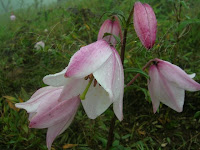 |
| Typical landscape around Imphal - with lots of water and paddy |
 |
| Kabaw Valley - View from Tengnoupal |
 |
| Tengnoupal village Manipur in the Meitei language means 'The land of Jewels' ! It has about 29 dialects, with a composition of 46 % Hindus who follow Vaishnavism since the 15th century AD and Christians who comprise of 35% of the population. Manipuris are a highly cultured, soft spoken community. They have a rich cultural heritage to which they fiercely cling to. Theatre, sports and a form of martial art called Thang-ta are extremely popular. Ras-Lila, the Manipuri dance form is very famous and is performed elegantly and rhythmically. Many of you will be surprised to learn that Manipur is the birthplace of Polo in the world. It has produced outstanding Polo players like Ojhatombi and Shyamjai Sharma who unfortunately did not get the opportunity of showcasing their talents in an International forum. The Manipuris are keen footballers too. Their woven fabrics, sarees and phanek- innpahi are to die for. Rice is their staple diet with a lot of fish and leafy veggies. It is a sight to behold - the wide expanse of paddy cultivated fields all along the exotic Imphal valley. As the old Burma road unwinds, snaking it's way uphill from Thoubal to Tengnoupal, pages of history slowly begin to unfold. This is the very road which has witnessed bloody and fierce battles between the Japanese and Allied Forces during the World War 2, all the way to the twin towns of Moreh ( India ) and Tamu (Myanmar). It has been also a silent spectator to the havoc of the Naga-Kuki-Meitei insurgency. Sadly, a blood soaked road of yesteryears. |
While we were there in the '90s we were privy to a yearly ritual of Japanese delegations coming in chartered buses to pay tribute to their dead. It is a heart wrenching sight to see the young and the old, reverently carrying a picture of their loved one around their neck. They call out to their martyrs who lie somewhere in the folds of the hills, anonymously in everlasting rest. They indeed call out each of their names, say special prayers, strew flowers everywhere and keep their favourite food too. Some very old men and women would tearfully bid a sad adieu not knowing whether they can ever make it again in this lifetime. Surely time and tide wait for none! Whenever we would do some new construction in this area it was so sad and disheartening to see skeletons, skulls, ancient Military boots, helmets, water bottles, personal effects like keys and copper coins tumbling out of the hills. A grim reminder of unsung, unknown heroes and an era lost to the present day civilization.
 |
| The Japanese delegation paying homage to their martyrs |
Tengnoupal I discovered, witnessed the most glorious sunsets. The skyline gets strewn with a myriad different colors and hues as though God himself was painstakingly painting this oversized canvass. I watched these pristine sunsets as often as I could and yet not had a fill of it. The sun would slowly and gradually sink behind the hills pulling the curtain over yet another splendid day. I would think to myself how fortunate I was while most of my countrymen had either not heard of this awesome part of India or endeavored to make a trip this side.
This time we had gone to specially attend a traditional Manipuri wedding of a friend's daughter.What a great experience it was! Manipuri weddings are a rather formal affair unlike weddings in other parts of India.While the bride and groom are getting set to come to the Mantap , the drum dancers (Phung Cholom) perform a scintillating dance, an invitation to the Gods. The bride looks as radiant as an Oriental Princess dressed in a traditional Manda and all her finery. The couple does not smile or talk during the proceedings because they believe that if they do so, the opposite may befall them in their wedded life.
 |
| Our Manipuri Bride |
Unless we Indians travel the length and breadth of our country extensively,we can hardly savor India in her true form and vividity. Also worth a visit is the Loktak Lake with its floating islands that move, called 'Phumdi' . The Seroi Lily in the Ukhrool district is a sight to behold.
 |
| Seroi Lily |
 |
| Loktak Lake |
 |
| Loktak lake with the floating islands |
A must see is also the RKCS art gallery, in Imphal.
So folks, next time you pack your bags and plan a holiday, do visit the North-East ... It is an experience of a lifetime.
I sincerely hope and pray that we all can put our guns back in the armoury, every one of us , and join the mainstream , thereby looking forward to a better tomorrow. Enough of blood has been spilt, we need to infuse life now and work shoulder to shoulder to develop this beautiful State. Let's dare to follow the star blazed road.
"Old candle - Let it burn bright - its light may show a path to someone in the dark"
-Anonymous
* References:
Manipur - Wikipedia, the free encylopedia.
Available at http://en.wikipedia.org/wiki/Manipur





